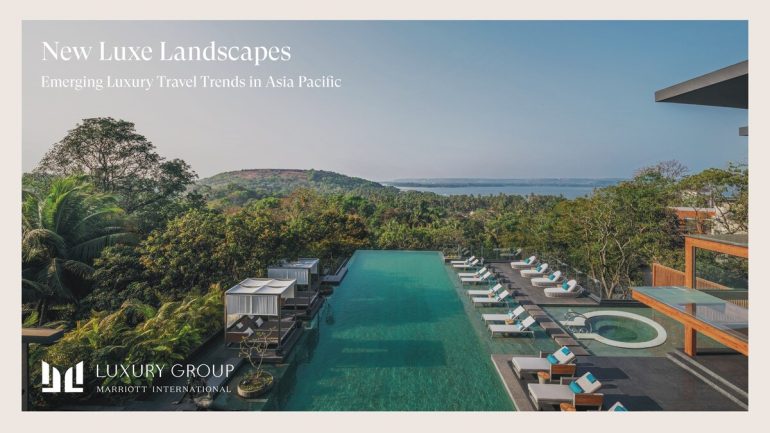The Luxury Group by Marriott International conducts extensive research among wealthy travelers in six markets, with 74 % of respondents planning an intra-regional vacation in Asia-Pacific ( APAC ) and 68 % spending more on leisure travel.
Australia is the best place in next 12 weeks ahead of Japan, with 46 % planning to visit
89 % of Indians plan to spend more in the next year, while 89 % of Indians are the ones who are the driving force behind luxury travel.
Luxury travel is primarily driven by high-end gastronomy, with 88 % of travelers planning vacations around food.
Three brand-new comfort tourist personas were born.
SINGAPORE, July 1, 2024 /PRNewswire/– As the Asia Pacific region continues to be the growth engine for luxury travel, a fresh detailed report from the Luxury Group by Marriott International has identified fresh expectations and travel preferences among higher- net- worth ( HNW) travelers in Asia Pacific. In the entire region, 68 % of Indians plan to spend more on travel over the next 12 months, with 74 % of them planning to travel within Asia Pacific, and 88 % of them give gastronomy as the main reason for their travel. One in four of all holidays planned ( 25 % ) are celebrations. The” Vent Travelist” who seeks business opportunities while traveling, the” Experience Connoisseur” Millennials who are traveling for entertainment, and the” Timeless Adventurer” who are creating their own itineraries and exploring new locations before they become popular have come up as three distinct new groups of luxury travelers. Continue Reading
The Asia-Pacific Luxury Travel Industry Is Redefining its Future
” Our New Luxe Landscapes Report provides deeper behavioral insights and motivations into elite travelers from Asia and the Pacific”, says Oriol Montal, Managing Director, Luxury, Asia Pacific ( excluding China ), Marriott International. Our analysis has identified fresh tourist archetypes and provides Marriott International with new insights into catering to this discerning traveller section.” Whether it’s discovering fresh culinary experiences, traveling with their family or friends, or looking for connections with the local community, our research has identified fresh traveler archetypes,” according to research conducted among HNW travelers in Australia, Singapore, South Korea, Japan, Indonesia, and India. Within the next twelve weeks, an average of six luxury trips are planned, and 33 % of respondents plan at least seven vacations this year. On ordinary, a brief stay comprises three nights while a longer stay is two- and- a- third weeks. More than 70 % of people choose to travel with family or friends, which increases the depth of the travel experience. Australia is the destination of choice ( 46 % ), above Japan ( 42 % ) and Hong Kong, China ( 27 % ). 69 % of India’s HNW tourists are planning a trip to Australia and it is the top destination of choice for Indonesian, Japanese and Singaporean travelers. Growing Demand in India 89 % of Indian residents say they plan to spend more on travel. This is the most active and engaged travel market. Families and friends are on a three-day trip together to celebrate significant milestones, attend a private event, or party, with 38 % planning a trip with friends, and 33 % making theirs a celebratory one. A Passionate for Food88 % choose their vacation destination based on gaining new tastes or culinary experiences. Nearly half of the respondents ( 49 % ) describe a fine dining experience as the ideal night out because they are acutely aware of dining trends. This is reinforced by the fact that 35 % of respondents said they would spend more on creating unique culinary experiences and that 83 % would choose a destination to visit an award-winning restaurant. 81 % of HNW travelers base their choice on excellent dining choices, and 83 % choose a destination so they can visit a renowned restaurant. New Traveler Personas With more money available for travel and a growing ageing population, the study has identified three new types of affluent travelers. These include: i ) The’ Venture Travelist ‘
The next- generation Bleisure tourist, the Venture Travelist prioritizes holiday destinations that will generate business opportunities. They are always looking for a deal, despite enjoying their vacation with their loved ones and their families. Entrepreneurs at heart, they explore a location, shopping for local products and antiques, and looking to forge business connections with members from the local community. ii ) The’ Experience Connoisseur ‘
Predominantly millennials, Experience Connoisseurs plan their leisure travel as an opportunity for personal enrichment. They consider their extensive travel to be an investment in both their mental and physical well-being. They want to deeply explore a destination, they value personalization and actively seek exclusive one- of- a- kind experiences. iii ) The’ Timeless Adventurer ‘
Debunking every stereotype of the over- 65 ‘ silver set travelers’, Timeless Adventurers are keen explorers who want to immerse themselves in a destination. They are more drawn to the elements that give the destination a sense of place, what makes it distinctive, and what makes it memorable. The full report is available to download. The findings are based on a research report that Marriott International Luxury Group commissioned over the course of a study that included frequent international travelers who primarily travel for leisure between April 18, 2024 and May 13, 2024. The study targeted the wealthiest 10 % of residents in Australia, Singapore, India, Indonesia, South Korea, and Japan with 200 respondents from each market. For more information on the preferences of luxury travelers in the APEC region, refer to Annex A for more information. About Marriott InternationalMarriott International, Inc. ( Nasdaq: MAR ) is based in Bethesda, Maryland, USA, and encompasses a portfolio of nearly 8, 900 properties across more than 30 leading brands in 141 countries and territories. Marriott owns and franchises hotels and resorts for vacationers all over the world. The company offers Marriott Bonvoy®, its highly awarded travel program. For more information, please visit our website at www. marriott.com, and for the latest company news, visit www. marriottnewscenter.com. In addition, connect with us on Facebook and @MarriottIntl on X and Instagram. About Marriott International Luxury PortfolioWith its unmatched portfolio of eight innovative luxury brands, Marriott International is developing authentic, exclusive, and unique experiences that today’s luxurian seeks. Spanning all corners of the world, Marriott International’s luxury brands group offers a boundless network of more than 510 landmark hotels and resorts in 70 countries and territories through The Ritz- Carlton, Ritz- Carlton Reserve, Bvlgari Hotels &, Resorts, St. Regis Hotels &, Resorts, EDITION, The Luxury Collection, JW Marriott, and W Hotels. The collection of luxury brands from the world’s most recognizable locations to the most incredible undiscovered gems is geared toward elevating travel with highly contextualized, nuanced brand experiences that signal the future of luxury by allowing guests to indulge their passions while fostering personal growth. India is the most engaged travel market, according to ANNEX A: 10 INTELLIGENT FACTS ABOUT THE CHANGING FACE OF LUXURY TRAVELERS ACROSS THE APAC REGION. In addition to taking three to four nights on average for a short trip, and two to three weeks for a long vacation, 89 percent of high-net-worth ( HNW) Indians are planning to spend more on their leisure travel. They are looking at six trips over the course of the year. Most self- sufficient travelers are Singaporeans. 61 % prefer to travel independently and curate their own itinerary, versus 43 % across the region. Sustainable travel is the most pressing social issue. 80 % of HNW travelers say a hotel’s sustainability and environmental practices are a factor when deciding where to stay because they are conscious of the impact their travel has on the environment. 43 % want hotel restaurants to offer locally produced food items, and 35 % want to see efficient food waste management. Most likely to holiday longer are Australians. It’s surprising that Australians take the longest vacations, with 73 % planning a minimum two-week getaway and 33 % taking more than three weeks, since they are entitled to a minimum of four weeks of annual leave. Similarly, a third of Indonesians expect their trips will extend beyond three weeks. A sense of security is the most crucial element in a luxury experience. The majority of respondents (91 % ) believe that a secure environment is more important than exceptional service ( 41 % ), participating in exclusive experiences ( 36 % ), or having a truly personalized experience ( 33 % ). The best reason to shop abroad is to purchase locally produced goods. Shopping is a key factor in HNW travel for HNW people, and 85 % of respondents say they give local products local products as a top priority when choosing where to go. South Korean travelers are the most likely to stay in their hotel. 54 % of travelers surveyed said they prefer to spend more time at their hotel or resort than at local attractions or socializing with locals. Genuine local dishes are the most popular cuisine, with over 62 % recommending unfamiliar local flavors over traditional fare. Top mark of a luxury holiday is discovering a new destination, with 78 % regarding it as important or very important. An immersive and refined sense of space is the most valued luxury experience, with 80 % of people defining luxury travel as being surrounded by exquisite craftsmanship and design. SOURCE Marriott International, Inc.

















































